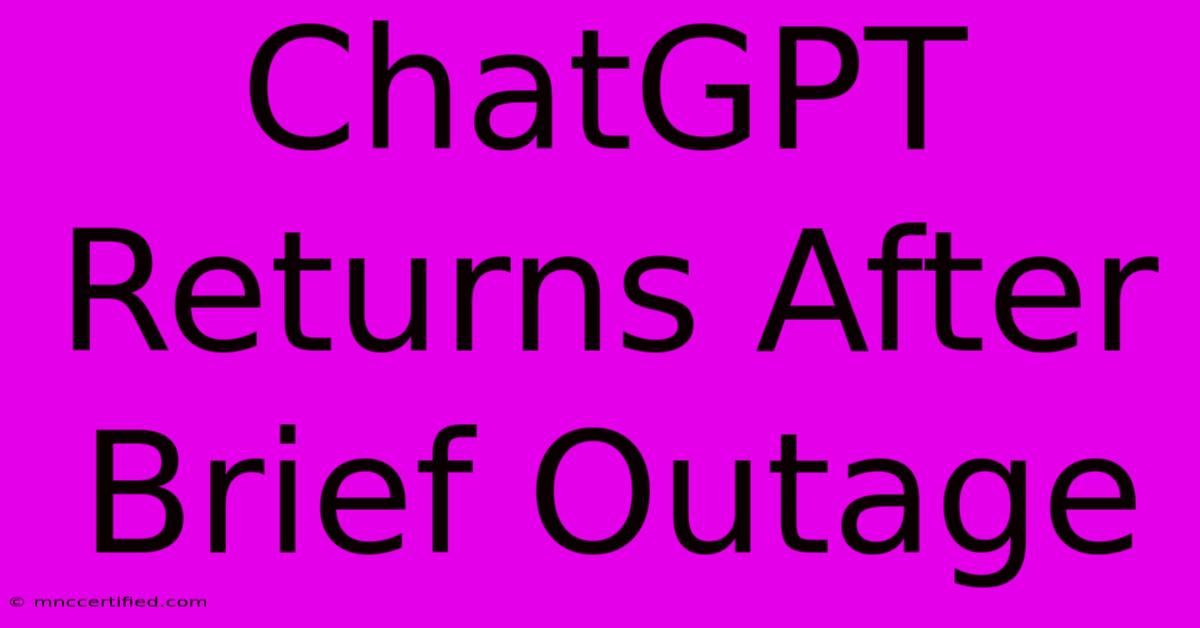ChatGPT Returns After Brief Outage

Table of Contents
ChatGPT Returns After Brief Outage: What Happened and What it Means for Users
ChatGPT, the wildly popular AI chatbot, experienced a brief outage earlier today, leaving many users frustrated and unable to access the service. While the exact cause of the outage remains officially unconfirmed by OpenAI, the impact was widespread, highlighting the increasing reliance on this powerful language model. This article will delve into the details surrounding the outage, explore potential causes, and discuss its implications for users and the future of AI technology.
The ChatGPT Outage: A Timeline of Events
Reports of ChatGPT's unavailability began surfacing around [Insert Time of Outage]. Users encountered various error messages, ranging from generic "service unavailable" notifications to more specific technical errors. The outage lasted approximately [Insert Duration of Outage], causing significant disruption for individuals and businesses relying on the platform for tasks ranging from content creation and code generation to customer service and research. The speed of OpenAI's response to the issue and the relatively short duration suggest a well-managed infrastructure and a swift problem-solving team.
Potential Causes of the ChatGPT Outage
While OpenAI has yet to release an official statement detailing the root cause, several potential explanations are circulating. These include:
-
Increased Server Load: The immense popularity of ChatGPT often leads to periods of high server demand. A sudden surge in users, perhaps triggered by a news event or a viral social media trend, could have overwhelmed the system's capacity. This is a common cause of outages for popular online services.
-
Software Glitch: A bug in the software code underlying ChatGPT could have triggered an unexpected shutdown or malfunction. Even seemingly minor glitches can have cascading effects, resulting in widespread unavailability. Regular maintenance and updates are crucial in mitigating the risk of such issues.
-
Network Connectivity Problems: Issues with OpenAI's network infrastructure, such as problems with their internet connection or internal network routing, could have prevented users from accessing the service. This type of issue would typically affect a larger user base than a more localized server problem.
-
Planned Maintenance (Less Likely): While less likely given the lack of prior announcement, planned maintenance is always a possibility. However, the abrupt nature of the outage suggests an unplanned event was more probable.
Implications of the ChatGPT Outage
The brief outage serves as a stark reminder of the importance of reliable infrastructure and robust error handling in the rapidly developing field of AI. The widespread disruption experienced by users underscores the growing dependence on AI tools like ChatGPT for various tasks.
This event highlights the need for:
-
Increased Scalability: OpenAI and other developers of AI platforms need to continue investing in infrastructure that can handle fluctuating user demand and accommodate future growth.
-
Redundancy and Failover Mechanisms: Implementing redundant systems and failover mechanisms ensures service continuity even in the event of unexpected failures.
-
Transparent Communication: Open and timely communication with users during outages is critical for maintaining trust and managing expectations.
The Future of ChatGPT and AI Accessibility
Despite the brief setback, ChatGPT's popularity remains undiminished. The quick resolution of the outage suggests a robust response system and commitment to providing a reliable service. However, future investments in infrastructure and software development will be essential to prevent similar disruptions as the platform continues to grow in both users and functionality. The incident also reinforces the importance of exploring alternative AI solutions and diversifying reliance on single platforms.
Keywords: ChatGPT outage, ChatGPT down, AI chatbot outage, OpenAI, AI service disruption, server overload, software glitch, internet outage, AI reliability, AI scalability, AI accessibility.

Thank you for visiting our website wich cover about ChatGPT Returns After Brief Outage. We hope the information provided has been useful to you. Feel free to contact us if you have any questions or need further assistance. See you next time and dont miss to bookmark.
Featured Posts
-
Miami Coach Change Courtney Replaces Larranaga
Dec 27, 2024
-
What Is Stuff Your Kindle Day
Dec 27, 2024
-
Red Wings Name Mc Lellan New Coach
Dec 27, 2024
-
Bridgewater Back Detroit Lions
Dec 27, 2024
-
J 20 Fighter Jet Chinas New Videos
Dec 27, 2024